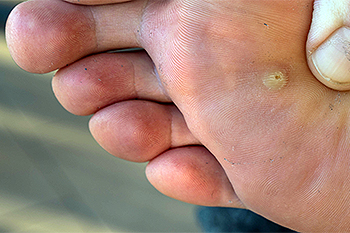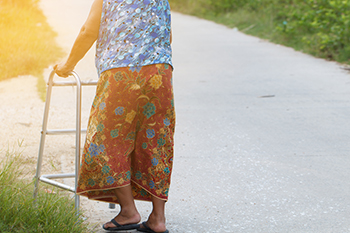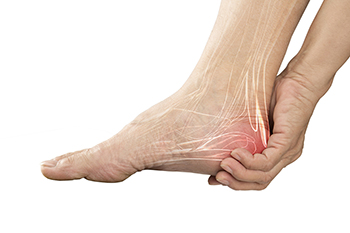Items filtered by date: July 2022
Plantar Warts May Be Rough or Smooth

Warts are skin growths and are caused by the human papillomavirus (HPV). It may take several months after coming in contact with the HPV to notice if warts have developed. They are known to be contagious and can spread by sharing towels, socks, or shoes. Plantar warts are located on the bottom of the feet and grow inward as a result of standing and walking all day. A plantar wart can be uncomfortable and can cause severe pain. Most people notice they look like a callus with tiny black dots in the middle, which are blood vessels. In other people, the wart may be smooth and flat. A proper diagnosis can consist of taking a sample of the wart and looking for any bleeding, a large size, or if they are fast-growing. Many warts will gradually disappear, although it is advised that if you have plantar warts you speak with a podiatrist who can properly treat them.
Plantar warts can be very uncomfortable. If you need your feet checked, contact one of our podiatrists from Summit Podiatry. Our doctors will assist you with all of your foot and ankle needs.
About Plantar Warts
Plantar warts are the result of HPV, or human papillomavirus, getting into open wounds on the feet. They are mostly found on the heels or balls of the feet.
While plantar warts are generally harmless, those experiencing excessive pain or those suffering from diabetes or a compromised immune system require immediate medical care. Plantar warts are easily diagnosed, usually through scraping off a bit of rough skin or by getting a biopsy.
Symptoms
- Lesions on the bottom of your feet, usually rough and grainy
- Hard or thick callused spots
- Wart seeds, which are small clotted blood vessels that look like little black spots
- Pain, discomfort, or tenderness of your feet when walking or standing
Treatment
- Freezing
- Electric tool removal
- Laser Treatment
- Topical Creams (prescription only)
- Over-the-counter medications
To help prevent developing plantar warts, avoid walking barefoot over abrasive surfaces that can cause cuts or wounds for HPV to get into. Avoiding direct contact with other warts, as well as not picking or rubbing existing warts, can help prevent the further spread of plantar warts. However, if you think you have developed plantar warts, speak to your podiatrist. He or she can diagnose the warts on your feet and recommend the appropriate treatment options.
If you have any questions please feel free to contact one of our offices located in Wilmington, Whiteville, and Wallace, NC . We offer the newest diagnostic and treatment technologies for all your foot and ankle needs.
Simple Fall Prevention Methods

Research has indicated that approximately one in three adults fall at least once per year. This can lead to serious foot injuries that can hinder completing daily activities. There are simple methods that can be implemented that may help to reduce falling episodes. When the lighting is improved in the household, it will become easier to see steps and obstacles that may be easy to trip over. Additionally, removing frayed rugs can reduce the number of falls incurred, and it is important to hold on to handrails while going up and down the steps. Many patients find it helpful to install grab bars in the shower and toilet area, and using a non-skid bathmat can provide stability in the shower. When a walker or cane is used, the sense of balance is often increased, and it is beneficial to keep a phone within reach in case a mishap occurs. It is helpful to have routine physical and eye exams performed, and this is needed to monitor existing medication and eyeglasses. If you would like more information about how falling can affect the feet, and effective fall prevention methods, please consult with a podiatrist.
Preventing falls among the elderly is very important. If you are older and have fallen or fear that you are prone to falling, consult with one of our podiatrists from Summit Podiatry. Our doctors will assess your condition and provide you with quality advice and care.
Every 11 seconds, an elderly American is being treated in an emergency room for a fall related injury. Falls are the leading cause of head and hip injuries for those 65 and older. Due to decreases in strength, balance, senses, and lack of awareness, elderly persons are very susceptible to falling. Thankfully, there are a number of things older persons can do to prevent falls.
How to Prevent Falls
Some effective methods that older persons can do to prevent falls include:
- Enrolling in strength and balance exercise program to increase balance and strength
- Periodically having your sight and hearing checked
- Discuss any medications you have with a doctor to see if it increases the risk of falling
- Clearing the house of falling hazards and installing devices like grab bars and railings
- Utilizing a walker or cane
- Wearing shoes that provide good support and cushioning
- Talking to family members about falling and increasing awareness
Falling can be a traumatic and embarrassing experience for elderly persons; this can make them less willing to leave the house, and less willing to talk to someone about their fears of falling. Doing such things, however, will increase the likelihood of tripping or losing one’s balance. Knowing the causes of falling and how to prevent them is the best way to mitigate the risk of serious injury.
If you have any questions, please feel free to contact one of our offices located in Wilmington, Whiteville, and Wallace, NC . We offer the newest diagnostic and treatment technologies for all your foot care needs.
Finding Perfect Shoes

Choosing shoes that are the correct size and fit can prevent unwanted foot injuries and discomfort. Key tips for finding perfect shoes are discussed here. Trace your foot and put the shoe you might buy on top of that tracing to see if it is the right size and shape. Shop for shoes in the afternoon as the foot naturally expands during the day. Wear the same foot coverings to the store that you might wear with the shoes being bought. Have a salesperson measure both feet and go with the size of your larger foot (if one of your feet is larger than the other). While standing, make sure the shoes have enough room in the toe box for the toes to move freely. Walk around in the shoes to make sure they fit properly. Are they wide enough, and not too snug or loose? Choose comfortable shoes by making sure the shoe does not have tags or seams that might irritate the foot or cause friction. Finally, examine the soles of the shoes to make sure they are sturdy and provide enough cushioning. If you are having trouble finding shoes that work well for your feet or are experiencing any kind of foot pain, consult with a podiatrist who can provide insight on shoes to purchase for your feet, as well as treat any foot problems you might have.
It is important to find shoes that fit you properly in order to avoid a variety of different foot problems. For more information about treatment, contact one of our podiatrists from Summit Podiatry. Our doctors will treat your foot and ankle needs.
Proper Shoe Fitting
Shoes have many different functions. They cushion our body weight, protect our feet, and allow us to safely play sports. You should always make sure that the shoes you wear fit you properly in order to avoid injuries and deformities such as: bunions, corns, calluses, hammertoes, plantar fasciitis, stress fractures, and more. It is important to note that although a certain pair of shoes might be a great fit for someone else, that doesn’t mean they will be a great fit for you. This is why you should always try on shoes before buying them to make sure they are worth the investment. Typically, shoes need to be replaced ever six months to one year of regular use.
Tips for Proper Shoe Fitting
- Select a shoe that is shaped like your foot
- Don’t buy shoes that fit too tight, expecting them to stretch to fit
- Make sure there is enough space (3/8” to ½”) for your longest toe at the end of each shoe when you are standing up
- Walk in the shoes to make sure they fit and feel right
- Don’t select shoes by the size marked inside the shoe, but by how the shoe fits your foot
The shoes you buy should always feel as good as they look. Shoes that fit properly will last longer, feel better, and improve your way of life each day.
If you have any questions, please feel free to contact one of our offices located in Wilmington, Whiteville, and Wallace, NC . We offer the newest diagnostic and treatment technologies for all your foot care needs.
Plantar Warts Can Be Treated!
How Older People Can Prevent Plantar Fasciitis

Many people over age 65 develop foot problems. One of the most common of these problems is plantar fasciitis, which causes pain in the heel of the foot. Plantar fasciitis is when the band of connective tissue running from the heel to the toes on the sole of the foot is overstretched or micro tears occur. Prevention of plantar fasciitis includes improving posture and walking properly, stretching the calves and ankles regularly, wearing shoes that fit well, and rolling tennis balls or frozen water bottles under the feet while sitting down to stretch and stimulate the bottoms of the feet. If you are a senior who continues to have heel pain or a caregiver of a senior complaining of such pain, see a podiatrist who can properly diagnose the condition and provide appropriate treatment.
Proper foot care is something many older adults forget to consider. If you have any concerns about your feet and ankles, contact one of our podiatrists from Summit Podiatry. Our doctors can provide the care you need to keep you pain-free and on your feet.
The Elderly and Their Feet
As we age we start to notice many changes in our body, but the elder population may not notice them right away. Medical conditions may prevent the elderly to take notice of their foot health right away. Poor vision is a lead contributor to not taking action for the elderly.
Common Conditions
- Neuropathy – can reduce feeling in the feet and can hide many life-threatening medical conditions.
- Reduced flexibility – prevents the ability of proper toenail trimming, and foot cleaning. If left untreated, it may lead to further medical issues.
- Foot sores – amongst the older population can be serious before they are discovered. Some of the problematic conditions they may face are:
- Gouging toenails affecting nearby toe
- Shoes that don’t fit properly
- Pressure sores
- Loss of circulation in legs & feet
- Edema & swelling of feet and ankles
Susceptible Infections
Diabetes and poor circulation can cause general loss of sensitivity over the years, turning a simple cut into a serious issue.
If you have any questions please feel free to contact one of our offices located in Wilmington, Whiteville, and Wallace, NC . We offer the newest diagnostic and treatment technologies for all your foot and ankle needs.

